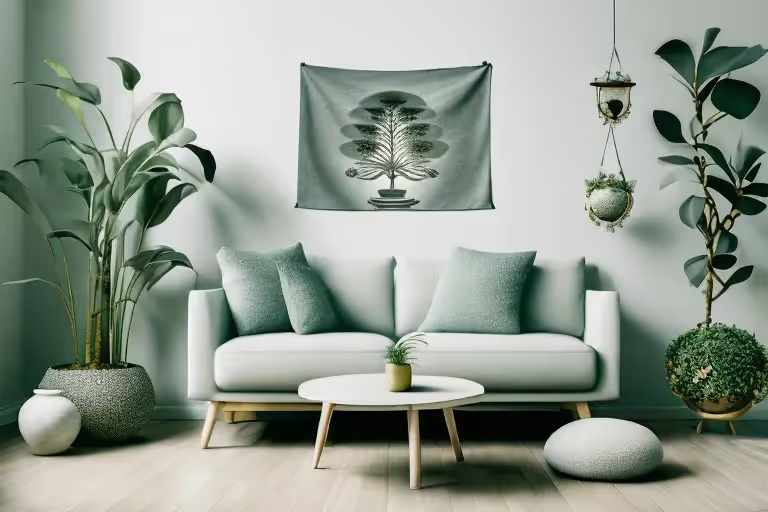Finding a quiet corner in your home for meditation can provide a sanctuary from the hustle and bustle of daily life. This sanctuary invites tranquility, fosters inner peace, and enhances personal growth. Let's explore how to establish a place of serenity and positivity in your home by designing a unique meditation room.
Understanding the Importance of a Meditation Room
Creating a designated meditation space is not about showcasing interior design skills, nor is it a mere trend. It's about carving out a physical space where you can reconnect with your inner self and feed your soul. It anchors one's practice, making it a more tangible part of daily life.
Let's delve deeper into the significant role of meditation and the necessity of a dedicated space for its practice.
The Role of Meditation in Daily Life
Meditation, an ancient practice rooted in mindfulness, has become an indispensable part of many people's daily routines. It clears the fog of stress and chaos, honing one's focus and inducing a calm oasis of thought. Furthermore, it enhances emotional well-being, increases resilience, and aids in personal growth.
Indeed, creating a quiet, dedicated space amplifies these benefits, promoting deeper concentration during meditation sessions.
Aura has the world’s largest and best collection of Meditations and hundreds of Coaches to choose from.
Try it Free!
Why You Need a Dedicated Meditation Space
Having a space set aside for meditation encourages consistency and commitment. It becomes your personal retreat, subtly reminding you to engage in regular meditation. Even the simplest of spaces can become a potent symbol of your commitment to self-care and mindfulness.
But what exactly does a dedicated meditation space look like? How can you create an environment that fosters tranquility and inner peace? Let's explore this in the following section.
Designing Your Meditation Space
When designing your meditation space, consider the following elements:
- Location: Choose a quiet corner or room in your home where you can retreat from distractions. Ideally, it should be a space with natural light and good ventilation.
- Ambiance: Set the mood with calming colors, such as soft blues or earthy tones. Use natural materials like bamboo or wood for furniture and decor to create a sense of grounding.
- Comfort: Invest in a comfortable meditation cushion or mat to support your posture during practice. Add soft blankets or pillows for added coziness.
- Minimalism: Keep the space clutter-free and minimalist. Remove any unnecessary items that may distract you during meditation.
- Personal Touch: Add personal touches that resonate with you, such as inspiring quotes, meaningful artwork, or objects that hold spiritual significance.
- Aromatherapy: Consider using essential oils or incense to create a soothing and calming atmosphere. Scents like lavender, sandalwood, or frankincense are known for their relaxation properties.
- Sound: Choose soft, ambient music or nature sounds to enhance the meditative experience. Avoid anything too distracting or energetic.
- Privacy: If possible, create a sense of privacy in your meditation space. Use curtains or room dividers to separate the area from the rest of your home.
By incorporating these elements into your meditation space, you create an environment that supports relaxation, focus, and inner peace.
Getting Started: Basic Elements of a Meditation Room
Realizing your meditation room idea doesn't require a large budget or plenty of space. Even a small corner or an under-used closet can be transformed with just a few essential elements. The key is to make it personalized and inviting.
Creating a meditation room is a wonderful way to establish a dedicated space for self-reflection and inner peace. It allows you to retreat from the busyness of everyday life and immerse yourself in a tranquil environment that promotes relaxation and mindfulness. Whether you are a seasoned meditator or just starting your meditation journey, having a designated space can greatly enhance your practice.
Choosing the Right Location
Start by identifying a quiet, comfortable spot in your home. You could choose a naturally bright area near a window, an airy loft, or even a garden shed. The chosen location should be somewhat isolated, allowing you to meditate without disruptions.
Consider the energy flow of the space as well. Feng shui principles suggest that a meditation room should be located in a space with positive energy, away from distractions and clutter. This will help create a harmonious atmosphere that supports deep relaxation and focus.
Essential Meditation Room Items
Comfort should be your guide when selecting the essentials for your meditation room. You'll need a comfortable seat, whether a cushion, chair, or yoga mat, along with calming elements such as candles, soft lighting, and perhaps some peaceful music.
Choose a seat that allows you to maintain a relaxed yet upright posture, promoting proper alignment of the spine. This will help you stay alert and focused during your meditation practice. Experiment with different seating options to find what works best for you.
Incorporating nature can also enhance the peaceful ambiance by adding a few plants or a mini-water fountain for a soothing, trickling sound. Nature has a way of soothing the soul and connecting us to the present moment. Surrounding yourself with greenery can evoke a sense of calmness and serenity, making your meditation experience even more enriching.
Additionally, consider incorporating elements that hold personal significance to you. This could be a meaningful piece of artwork, a cherished memento, or a symbol that represents your spiritual beliefs. These personal touches will infuse your meditation room with your unique energy and make it a space that truly resonates with you.
Creating a meditation room is a journey in itself. As you explore different elements and experiment with the arrangement of your space, you'll discover what truly nurtures your practice and enhances your sense of inner peace. Remember, there is no right or wrong way to create a meditation room. Let your intuition guide you and trust that the process will unfold organically.
20 Creative Meditation Room Ideas
With the basics in place, let's now explore 20 creative ideas for your meditation room that cater to different tastes and spaces. These various styles can foster a calming environment, boosting your mindfulness practice.
Nature-Inspired Meditation Rooms
Inspired by the tranquility of nature, infuse your room with natural elements such as plants, stones, or images of serene landscapes. You could even bring in elements like driftwood or seashells if you're near the beach.
Imagine walking into your meditation room and being greeted by the gentle rustling of leaves from a potted plant in the corner. The earthy scent of fresh soil fills the air, instantly transporting you to a peaceful forest glade. As you settle onto your cushion, you can't help but feel a deep connection to the natural world, grounding your practice in the beauty and harmony of nature.
Use nature-inspired colors, like leafy greens or sky blues, to foster a serene and grounded atmosphere. The soft green walls create a sense of tranquility, while the blue accents remind you of the vastness of the sky, encouraging expansive thoughts and a sense of openness.
Minimalist Meditation Spaces
Minimalist rooms emphasize simplicity and functionality. Decorate with neutral colors and keep the décor minimal, only having essential furniture and minimal decorative items. This style cultivates tranquility by eliminating clutter and distraction.
Imagine stepping into your minimalist meditation space, where every item has a purpose and every surface is clean and uncluttered. The absence of excess allows your mind to settle and focus on the present moment. A single, beautifully crafted meditation cushion sits on the floor, inviting you to sit and find stillness. The simplicity of the room mirrors the simplicity of your practice, allowing you to let go of unnecessary thoughts and distractions.
You can use a simple floor mat, a meditation cushion, or even a single flower in a vase to symbolically focus your meditative energies. The clean lines and neutral colors of the room create a sense of calm, while the thoughtful placement of objects encourages a sense of balance and harmony.
Color-Themed Meditation Rooms
Your meditation space can truly reflect your personality by being decorated in your favorite color or a shade that evokes peaceful emotions for you. Cool tones often help to create a peaceful ambiance, but feel free to choose any color that resonates with you.
Imagine entering your color-themed meditation room, where every shade and hue is carefully chosen to create a harmonious and soothing environment. The walls are painted in a soft lavender, a color known for its calming properties. As you settle onto your cushion, you're surrounded by pillows in various shades of purple, creating a cocoon of tranquility. The room envelops you in a sense of peace and serenity, allowing you to fully immerse yourself in your meditation practice.
Using pillows, wall color, and decorative items in a cohesive color scheme creates a visually soothing environment. The intentional use of color helps to create a sense of harmony and balance, allowing you to relax and let go of any tension or stress.
Meditation Rooms with a View
If you’re lucky enough to have a tranquil and scenic outdoor view, let nature’s beauty serve as the backdrop for your meditation room. Large windows or glass doors that frame nature or cityscapes can offer visual tranquility during meditation sessions.
Imagine sitting in your meditation room, surrounded by floor-to-ceiling windows that overlook a lush, green garden. As you close your eyes and begin to meditate, the soft rays of sunlight filter through the leaves, casting a gentle glow on your face. The sound of birds chirping and leaves rustling in the breeze becomes the soundtrack to your practice, grounding you in the present moment and connecting you to the natural world.
The constantly changing nature or cityscape also serves as a reminder of the ephemeral nature of life, adding depth to your mindfulness practice. As you watch the seasons change or the city lights twinkle in the distance, you're reminded of the impermanence of all things, encouraging you to fully embrace the present moment and let go of attachments.
Multi-Purpose Meditation Spaces
Space constraints should not limit your dream for a meditation room. Your meditation space can easily share functionality with other rooms. A living room corner, a peaceful bedroom setting, or even a quiet home office can double as a meditation area.
Imagine transforming a cozy corner of your living room into a dedicated meditation space. With the help of room dividers or curtains, you create a tranquil oasis within a larger room. As you step into this space, you leave behind the distractions of everyday life and enter a sanctuary of peace and stillness.
Use room dividers or curtains to delineate the meditation space when in use, ensuring a tranquil, dedicated area within a larger room. The boundaries created by the dividers or curtains help to create a sense of separation from the outside world, allowing you to fully immerse yourself in your practice. The carefully chosen decorations and soothing colors create a serene atmosphere, making this multi-purpose meditation space a true haven for mindfulness.
Incorporating Personal Touches into Your Meditation Room
Making your meditation room unique and personal can greatly enhance your meditative practice. Your personal style and preferred aesthetics reflect who you are and can make the space feel genuinely yours.
Using Personal Symbols and Artwork
Unique symbols, artwork, or photographs that evoke calming emotions can serve as focal points during meditation. You may wish to add a beautiful image of a deity, a spiritual symbol, or even a cherished photo or painting that calms and centres you.
It's essential to choose items that encourage a sense of harmony and don’t incite distracting thoughts or emotions.
Adding Family Heirlooms or Sentimental Items
Sentimental items or family heirlooms imbued with personal history and emotional value can also enhance the spiritual aura of your meditation room. These items will infuse the space with a sense of belonging and continuity, fostering a profound emotional connection.
In conclusion, creating a meditation room is a personal journey, reflecting your unique needs and style. It anchors your meditation practice, contributing to personal growth and mental peace. As you ponder these ideas and begin to build your own sanctuary, consider augmenting your practice with the Aura Health app. Its guided meditations, soothing sleep stories, and life coaching can further support your journey towards mindfulness and tranquility.
Aura is Your All In One App for Meditation, Mindfulness Wellbeing
Find peace every day with one app for your whole well-being. There is no one-size-fits-all solution to mental well-being. Aura is the first all-in-one wellness app that learns how to best help you. Discover an endless library of expert-created tracks for your well-being, all taught by the world’s best coaches, therapists, and storytellers. With Aura's personalized recommendations, you can find peace every morning, day and night.
Aura has the world’s largest and best collection of Meditations and hundreds of Coaches to choose from.



.webp)






.avif)

%20(1).avif)


.avif)
.avif)
.webp)


.avif)


















































































































.avif)

















.svg)









